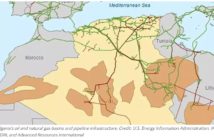With international intervention looming in Mali, Algeria is taking another look at a border surveillance system.
By Walid Ramzi for Magharebia in Algiers
![[AFP/Farouk Batiche] Algeria is looking to step up security on the remote southern border.](http://magharebia.com/cocoon/awi/images/2012/11/16/121116Feature3Photo1.jpg)
[AFP/Farouk Batiche] Algeria is looking to step up security on the remote southern border.
Algeria is studying the creation of a sophisticated system to monitor its borders and secure entries used by terrorists and smugglers to infiltrate from the Sahara.
Numidia News reported November 6th that Algeria intends to launch an international tender for the project. The defence ministry had postponed implementation of the project, which was scheduled to commence in 2011. The ministry has already received delegations from foreign companies specialising in monitoring systems.
The issue has become especially important due to the increase in security threats and the fears of continued security deterioration in the Sahel.
The system will operate through the deployment of electronic surveillance points, alarms and radars to detect infiltration attempts by people and vehicles. This system will work in conjunction with the launch of intensive aerial operations along the border.
This project was first explored in 2006, but the Algerian authorities decided to postpone its implementation because of its high cost, then estimated at $1.5 billion. The measures are expected to include radar coverage, additional patrols, modern surveillance systems, as well as the possibility of using airborne traffic control and other measures.
“Algeria relies on a double-pronged approach to border protection,” according to Taher Ben Thamer, a former military officer. “They are securing the borders and launching measures to develop the border areas by stabilising the actual population via opening routes and new roads to facilitate the movement of goods. They are also developing commercial activities by laying a fiber optic network, allowing users to keep in touch with their relatives.”
Ben Thamer added that the deteriorating security situation on the border with Mali and the unstable situation in Libya “pushed the Algerian authorities to take such security measures in order to counter any potential dangers that the southern cities may face”.
Algerian Army units in November began building a 50km-long electric fence between the Algerian town of Bourj Badji Mokhtar and Malian territory. El Khabar reported that the fenced off area was one of the most sensitive for the country.
“The situation witnessed by Mali is a microcosm of what the region of the Sahel could experience in the event of the countries of the region failing to stop cross-border arms smuggling,” according to Kamal Hadif, a specialist in Malian security affairs.
Related Articles
Algeria arrests AQIM judge
2012-08-23
AQIM leader killed in Mali car crash
2012-09-11
Aid workers kidnapped from Tindouf camp
2011-10-25
Libyan arms pose new dangers for Maghreb
2011-11-02
Sahel-Sahara military leaders discuss joint security efforts
2010-04-15
He added that “many security reports talked about attempts by terrorist groups to store significant amounts of smuggled weapons in desert areas difficult to detect, or in mountain caves, in order to use later in terrorist operations”.
In the latest border security operation, authorities arrested a suspected terrorist November 6th. The Nigerian national, allegedly admitted to belonging to the Movement for Tawhid and Jihad in West Africa. He was reportedly tasked with a suicide attack on a security institution in one of the southern wilayas.
Earlier, military troops October 31st stopped twelve insurgents who reached illegally the province of Illizi and were in the process of crossing to Mali to support jihadist organisations. Security forces confiscated SUVs and machine guns.
On the same day and in the same province, security forces arrested six smugglers. Two SUVs were confiscated in addition to 21 weapons that were seized from the detainees who were also on their way to Mali, coming from the Libyan city of Ghadames.
.






